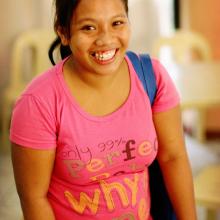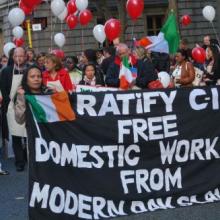Women and Girls
A downtown Los Angeles interfaith center that once served as a synagogue was the site of a historic worship service last week, as dozens of women gathered for Friday Muslim prayers in what is being dubbed the first women’s-only mosque in the United States.
M. Hasna Maznavi, founder and president of the Women’s Mosque of America, and co-president Sana Muttalib, said they are following the example of women pioneers at the forefront of Islamic education and spiritual practice.
“Women lack access to things men have, professional or religious,” said Muttalib, a lawyer. “I think this is our contribution to help resolve that issue.”
Maznavi, a filmmaker, said women-only spaces have been part of Islamic history for generations and still exist in China, Yemen and Syria. In the United States, nearly all mosques separate the sexes. Women pray in the rear of the prayer hall or in a separate room from male congregants.
About 100 women attended the jumah or Friday prayer on Jan. 30 in a rented space at the Pico Union Project, just a few minutes from the Staples Center.
Edina Lekovic, director of policy and programming at the Muslim Public Affairs Council, gave the sermon.
Today, I am the Managing Director of Freedom a la Cart, a social enterprise that offers employment, workforce development, and supportive services to local, adult survivors of human trafficking. The women that I work with are victims of unimaginable trauma and abuse. They are also the strongest, most resilient women I know. Through their words and actions they continue to teach me the power of loving oneself.
Because here is my deepest, darkest secret—the one that I never speak about. The one that I shove deep down and hope that no one ever learns about.
I struggle to love myself.
I am the boss, the director, a caretaker, an advocate for social justice. But I don’t love myself, and I struggle with self-worth daily. I am a perfectionist and constantly feel that I am “not enough.”
It wasn’t until my 30th year of life that I realized how broken and human I was. Jesus tells us to love our neighbor as we love ourselves. I was doing a terrible job of loving myself and realized I could not truly love these survivors until I loved myself.
All too often, advocates and activists present themselves as superheroes, rescuing the poor and defenseless. We hide our fear, our guilt, our shame, our self-loathing, because we are supposed to be the strong ones. We are supposed to have all the answers. And yet what is demanded of us isn’t perfection, but rather our faithfulness and willingness to be vulnerable.
Closer to home, one of the messages that many of us often hear is that there is slavery in the supply chains of the products that we buy every day: cotton, chocolate, produce. This can be paralyzing when we go to the mall or the grocery store. None of us want to purchase something that originates in an extreme human rights violation. But the solution cannot be simply to buy a different product. When we talk about labor trafficking, we must keep the focus on the worker who is enslaved rather than the product we consume.
As a rabbi, I know that is not my tomato or banana that is created in the image of God—it is the person who picked that product. Fighting for food justice means ensuring the human rights and wages of workers, and doing so in a way that places the needs, dignity, and expertise of the workers at the head of the table. This last piece is crucial: no one can tell us how best to solve human rights abuses in supply chains, including modern slavery, more than the workers who have the most at stake...
We must raise up the leadership of those most affected by forced labor and support their efforts to create new futures for themselves. Since 2011, T’ruah has taken more than 50 rabbis to Immokalee to learn from the CIW. The stories they hear—and the transformation they see—inspire them to go home and turn their congregations into more than just educated consumers. They become activists: they write letters to corporations urging them to join the Fair Food Program, stage protests, take Hebrew school students to meet with managers, write op-eds, and deliver sermons. Our #TomatoRabbis have become part of the larger movement of Fair Food activists, urging corporations to live up to their professed values and join the new day dawning in the Florida tomato industry that is the only proven slavery-prevention program in the U.S.
Augustine’s principle of avoiding revictimization and providing care can be applied to those who are sexually exploited. As my colleague Lani Prunés points out, the federal government and most states have Safe Harbor Laws which treat trafficked minors as victims rather than criminals.
These victims didn’t violate their own chastity and, therfore, are not guilty. But an unfortunate number of states don’t provide trafficking victims immunity from prosecution or adequately fund reintegration services. In so doing, we continue to maintain the shame-based morality of Greco-Roman culture in which the victim of exploitation is responsible for the sin and crime of human trafficking.
Legal protections are essential to aid reintegration, but moral protections are also necessary to support trafficking survivors. By funding recovery programs, we can learn from Augustine the value of not blaming the victim. Victims should be given the help they need to reintegrate into society (as organizations such as FAIR girls, Courtney’s House, or End Trafficking are doing), rather than leaving them vulnerable to returning to a dangerous and degrading form of life.
If we allow people to be shamed or forced into crime through a lack of viable alternatives, we are morally culpable like the Greco-Roman society which taught women that their life was only worth as much as their physical purity.
After the high-profile domestic violence cases of Ray Rice and Adrian Peterson, the NFL is speaking out with a new Super Bowl Ad. The commercial features a woman pretending to order a pizza in a call to a 911 operator as the camera rolls over shots of a disheveled home. The operator eventually comes to understand that the woman is trying to ask for help without alerting her abuser.
The NFL created the ad in partnership with No More, an umbrella organization that connects groups working to end domestic violence and sexual assault.
A Catholic priest who recently took charge of a San Francisco parish has said only boys can be altar servers, a move that is sparking both criticism and praise and comes amid a wider debate over conservative concerns that the Catholic Church has become too “feminized.”
In discussing birth control and population issues when visiting the Philippines recently, Pope Francis said the Catholic Church promoted “responsible parenthood” that didn’t require good Catholics to be “like rabbits.” The frank imagery prompted a flurry of playfully creative headlines that ranged from mocking to woeful. And the byproduct of such reaction stories? The continued misinformation on what Catholics currently practice and what the Catholic Church actually teaches when it comes to family planning.
The pope’s remarks referenced Catholic teaching that prohibits artificial birth control. Family size, according to the Church, should be regulated by abstinence or a form of Natural Family Planning, sometimes characterized simply as trying really hard not to have sex when you’re “not supposed to,” which often fails and results in a ton of kids. Proponents of NFP say the method(s), and its practitioners, are too often misunderstood.
NFP for pregnancy prevention involves charting a woman’s cycles by testing for various biological markers — like basal temperature or cervical mucous — in order to assess fertile days and abstain from sex during that time. According to the World Health Organization, fertility awareness methods like NFP are 95-97 percent effective when used correctly and consistently (75 percent with typical use), and individual NFP models claim higher effectiveness.
Practicing NFP can certainly be complicated, especially when taking into account marriage and family dynamics that aren’t always conducive to the attention it requires.
But while it may be more difficult than, say, popping a daily pill or using an IUD, modern technology — like tracking apps and temperature-monitoting gadgets — is simplifying the process and coinciding with a resurgence in popularity. NFP practitioners say they appreciate the choice it offers — whether the motivation is following Church teaching or simply avoiding synthetic hormones.
If you’re reading this, you probably already know that modern-day slavery is a thriving, lucrative, global business. There are more slaves alive today than during the entire 400 years of the trans-Atlantic slave trade. Human trafficking generates about $150 billion in profits every year. And 1 in 3 trafficking victims are children.
The statistics are staggering.
For me, it was a single story that moved me through the numbers to a place where I could take action. I heard about Charina* when I joined International Justice Mission. She was one of the first girls we helped rescue in Cebu, Philippines.
Charina was 13 when she was sold for sex.
Her family was very poor, and she had dropped out of school in fourth grade. Her mother was the first one who sold her. For the next couple years, pimps took turns selling her from street corners and seedy piers. They earned extra because she looked so young.
Charina was finally freed from this harsh cycle of violence in 2007. She was addicted to drugs, pregnant and unable to trust the people who wanted to help her. The work of freedom was just beginning.
My colleagues started meeting regularly with Charina. She needed professional care and a customized plan to meet her unique and complex needs. She needed trauma-focused counseling. She needed to learn how to trust others and to believe in herself once again.
When I first heard her story and saw a photo of Charina—her bright eyes, her small frame—my first reaction was anger. This young woman should never have suffered in the many ways she has.
And that anger is right. It’s not fair.
Charina’s story has illuminated another reality for me, a more hopeful one. It doesn’t have to be this way.
In a few days, Americans will gather across the country to watch the Super Bowl.
But what many of them don’t know is what happens outside of the stadium—a seedy underworld that profits off the sale of American children.
Every year, approximately 100,000 children are forced into prostitution in the United States—and many are illegally “bused in” to locations hosting major sporting events like the Super Bowl. Once the game is over, victims are relocated to the next profitable event.
The trafficking of our kids is not a game.
I can tell you firsthand that homeless children—desperate for food, shelter, and comfort—are the biggest victims of this horrific industry. At Covenant House, we’ve seen too many of these innocent children come through our doors.
I can also tell you that no homeless kid sells his or her body by choice. In a survey we conducted with Fordham University, almost 25 percent of homeless kids were either victims of trafficking or felt they needed to trade sex in order to survive.
ALL of them greatly regretted having to trade their bodies—a trauma that can haunt them for the rest of their lives.
We are doing everything we can to help these victims, as well as ensure that homeless kids who are at risk of becoming victims never fall prey to this vile industry.
When stories of human trafficking or dramatic rescue operations come across our news feeds, we are understandably shocked. For a moment, our attention is grabbed and we feel genuine outrage toward the traffickers and, hopefully, compassion for the trafficked persons. But to what end?
Sadly, the underground and criminal nature of human trafficking helps to keep the stark realities out of sight and, consequently, out of the minds of most people. When we do think of human trafficking, it tends to be as something that happens “over there” or in seedy brothels. It is somehow easier to blame the bad actors, pimps, traffickers, and sweatshop managers rather than recognize the multiple ways that we are connected to human trafficking through our everyday actions. Because we are, in fact, connected. As Pope Francis observed in his apostolic exhortation, Evangelii Gaudium: “There is greater complicity than we think. The issue [modern slavery] involves everyone!”
Human trafficking is present in virtually every human community. Moreover, because the majority of people held in slavery today are forced to work in agriculture and mining, it is inevitable that products make it into the supply chain and our shopping carts. Sex trafficking also does not happen in a vacuum, but rather in a social context which tolerates, and even normalizes, sexual exploiation and the commodification of the human person.
When a San Antonio couple was caught trafficking a 16-year-old online, their excuse was that they had no prior knowledge of her age and “were trying to help her.” Meanwhile, Jeffrey Charwick Wright, a now ex- Navy sailor, trafficked an HIV-positive 17-year old in Virginia, Maryland, and North Carolina for his own good. But hey, at least he could admit it.
These horrible anecdotes are popping up all over the U.S., with underage children—both Americans and immigrants—trafficked for labor, and more often, for sexual exploitation. The most surprising issue, however, is the conversation on whether those who are trafficked are criminals themselves. Sadly, in 19 states and all of the American territories, that is the case.
The good news is that a majority of states have some form of "safe harbor laws," laws that prevent underage victims of trafficking from facing criminal charges and from being treated as culpable and willing participants.
Everyone who desires to follow Jesus’ command to love can pour that love into their own communities, where thousands of children languish in foster care, are legally tangled in the juvenile system, and are raising themselves with no strong adults to guide them forward.
These children in our communities are vulnerable to human trafficking unless each of us does something about it. Right here at home.
In Matthew 5, Jesus tells us to love our enemies. We should love even the unlovable, especially the downtrodden, the forgotten. Don’t be afraid to love those that the world says aren’t worth it, the throwaways, the ones we too often pretend don’t exist.
Love big, love strong, love deep with compassion and bravery. Love those who spit in your face and curse you, the ones who break your heart over and over again. Your love may be the catalyst that keeps that one person from becoming a statistic.
Who will end slavery? You will. How will we end slavery? By God’s grace, through love and fortitude. Not in a faraway place but right here, at home.
I am co-owner of an online boutique store that empowers survivors of trafficking with employment.
I am a social entrepreneur.
I am an abolitionist.
I am…uncomfortable with these kinds of labels.
Because at the end of the day, I’m very ordinary, and these descriptors seem to imply that I’m not.
I live an ordinary life. I wake at the crack of dawn to drive my kids to school and then return home to work, trying to get most of my business done during the hours that my children are at school. Snow days and random holidays are the bane of my work life, and the words, “Sorry, hon, I’m working right now. Give me a minute?” come out of my mouth more than I’d like. I spend the lion’s share of my days on my laptop, troubleshooting, responding to emails, thinking about future lines of clothing, and making sure that the expenses won’t be more than that month’s income. Sometimes, in the midst of the daily humdrum of life, I forget that what I’m doing really does make a difference, half a world away, in the lives of survivors of trafficking.
Human trafficking is an overwhelming and complicated issue.
(Actually the root causes of human trafficking are complex. But there’s nothing complicated about treating people like people, not property).
Yet, how can those with little time to volunteer or a burgeoning desire to make some kind of difference do so?
Support socially responsible businesses! Here are five groups dedicated to helping sell the products of at-risk women and girls, as well as trafficking survivors—supplying them with work and the means to provide for their families.
Engage in smarter buying—invest in women, in their work, and in their futures.
Mint's life has been changed since working at NightLight. Having an economic alternative is an essential part of bringing liberation to women who have been trafficked or prostituted. The exit or rescue is only the beginning of freedom. At the same time, a job alone does not restore a woman to her true identity and humanity. There is a well of pain and trauma that lies beneath the surface.
Most organizations that provide after care for survivors struggle to support the financial burden of restoration. When the rescue is over, the support often dwindles before the woman is fully restored and ready to thrive on her own. Without intentional and holistic after care, victims who are rescued often find themselves vulnerable again. Left alone, the familiarity of their slavery can begin to look like the best option for survival.
A successful business can provide the wages and benefits needed to sustain a woman while giving her the opportunity to reach full restoration. When the greater community invests in freedom products, we can help vulnerable women reach their full potential.
For Mint’s sake and other women and girls, may it be so.
North America is home to an estimated 1.5 million trafficked persons alone. Many of these people are domestic workers—an industry with a growing worth of $8 billion in profits every year.
Many domestic workers in the United States are hard working people who enjoy their jobs and have fair working conditions. But the private and unregulated nature of the job does make these workers vulnerable to exploitation and sometimes a destination job for trafficked women.
This is the problem that authorities grapple with: how to regulate a global industry where workers are so open to exploitation and abuse.
Enter Convention 189—a document that creates international law preventing the trafficking and exploitation of domestic workers like Erwiana. This new international law deals with much of the complexity of the problem while still allowing domestic workers to earn a fair living and bargain for their conditions.
National governments have begun to sign on to Convention 189, but the U.S. and other larger countries are lagging behind in its support for tougher global protections for domestic workers.
For many, these new global protections can’t come fast enough. We know that the more countries like the U.S. sign onto Convention 189, the more robust the law will be and the better the protection for domestic workers.
Occasionally our governments need reminding that the plight of some of the most vulnerable must become a priority. Join me in calling on the United States to support global protections for domestic workers by ratifying Convention 189.
Living in a different time zone, I was not able to watch the live coverage of the Golden Globes, but I turned to the next best thing: Twitter. It didn’t take long before the newsfeed sounded out a collective gasp from Tina Fey and Amy Poehler’s Bill Cosby rape joke:
“Sleeping Beauty just thought she was getting coffee with Bill Cosby.”
Some may have thought the joke too offensive, that rape is too serious a subject to use as speech fodder, but I found it genius. Fey/Poehler called out the offense of a powerful man in his own arena, the world of entertainment where he gained his prestige, against the women he allegedly assaulted. They brought a buried injustice up to the surface, making the rich and glamorous squirm with discomfort — is that not the work of modern-day prophetesses? The fact that it came from two women who know first hand the misogyny in the male-dominated industry of comedy added another layer of irony and punch to the boundary-stretching joke. Tina Fey and Amy Poehler, women who are smart, talented, and gutsy enough to call out injustice, make me proud to be a woman. They are my people.
This past weekend, I’ve been following another event: the annual Gay Christian Network Conference in Portland. I take seriously my charge to find beauty in the margins. And whatever your stance is on the LGBT Christian debate, the fact that mainstream Christian media was conspicuously silent on covering the GCN conference is proof that within evangelicalism, gay Christians still live at the margins.
While baptizing 33 babies in the Sistine Chapel on Jan. 11, Pope urged mothers to breast-feed their infants if they were hungry.
“Mothers, give your children milk — even now,” Francis said. “If they cry because they are hungry, breast-feed them, don’t worry.”
The pope departed from his prepared text, which included the phrase “give them milk,” and inserted the Italian term “allattateli,” which means “breast-feed them.”
The celebration took place to mark the day Jesus was baptized by John the Baptist in the waters of the Jordan River.
Francis also asked the parents gathered to remember the poor mothers around the world.
“Let us thank the Lord for the gift of milk, and we pray for those mothers — there are so many, unfortunately — who are not able to give their children food to eat,” he said.
Human slavery has been in existence for thousands of years and unfortunately still flourishes today. An estimated 36 million slaves exist — perhaps more than any time in history —in countries around the world, even the U.S.
“You shall not pervert the justice due to the sojourner or to the fatherless, or take a widow’s garment in pledge.” —Deuteronomy 24:17
This verse names the three populations most vulnerable to exploitation: those living in a foreign country, children without parents, and women without protection. These populations have always been the most vulnerable to human trafficking, and they remain so today.
Hope for Justice aims to end human trafficking in our lifetime. And one priority to achieve that in the U.S. is training healthcare professionals to recognize victims of human trafficking. Almost 88 percent of victims of domestic sex trafficking encounter healthcare professionals while they are being trafficked.
Florida is a target state for traffickers, with the Tampa Bay area as a top destination for this monstrous activity. Tampa Bay has a lethal combination of tourism, world famous beaches, hospitality and agricultural industries, sports arenas, a military base, international seaports and airports, as well as a destination spot for one of thelargest adult entertainment industries in the nation. This combination attracts all forms of human trafficking which has become a larger money maker than selling drugs, as the human "product" can be used and re-used over and over again.


















